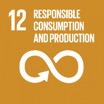Food waste
The global context of food waste

In September 2015, the United Nations General Assembly adopted a set of 17 Sustainable Development Goals (SDGs) as part of the 2030 Agenda for Sustainable Development. SDG 12 seeks to “ensure sustainable consumption and production patterns.” The third target under this goal (Target 12.3) calls for halving per capita global food waste at the retail and consumer levels and reducing food losses along production and supply chains (including postharvest losses) by 2030.
Food waste in the EU
Around 88 million tonnes of food are wasted annually in the EU, with associated costs estimated at 143 billion euros (FUSIONS, 2016).
All actors in the food chain have a role to play in preventing and reducing food waste, from those who produce and process foods (farmers, food manufacturers and processors) to those who make foods available for consumption (hospitality sector, retailers), Food Banks and other organizations recovering surplus food for redistributing it to the most deprived, and ultimately consumers themselves.
Wasting food is not only an ethical and economic issue but it also depletes the environment of limited natural resources. As it is stated in the Communication published by the European Commission, “food waste is an increasing concern in Europe. The production, distribution and storage of food use natural resources and generate environmental impacts. Discarding food that is still edible increases these impacts, and causes financial loss for consumers and the economy. Food waste also has an important social angle: donation of food that is still edible but that for logistic or marketing reasons cannot be commercialised should be facilitated.” (European Commission, Closing the loop – An EU action plan for the Circular Economy, 2 December 2015).
EU Platform on Food Losses and Food Waste
The EU Platform on Food Losses and Food Waste (FLW) is an initiative of the European Commission dedicated to the prevention of food losses and waste. The Platform has been established as part of the Commission’s Circular Economy Action Plan in order to support the achievement of the global Sustainable Development Goal (12.3) target on food waste which calls on all nations to halve food waste and reduce food loss by 2030. The Platform aims to support all actors in: defining measures needed to prevent food waste; sharing best practice; and evaluating progress made over time.
FEBA is a member of the EU Platform on FLW.
A new EU Directive on waste
On 22 May, the EU adopted the Directive (EU) 2018/851 amending Directive 2008/98/EC on waste (see here the full text of the Directive).
This Directive lays down measures to protect the environment and human health by preventing or reducing the generation of waste, and improving the efficiency of resource use, which are crucial for the transition to a circular economy.
The Directive contains some specific binding and non-binding provisions on food waste and food donation, including:
- Member States should provide incentives for the application of the waste hierarchy, including facilitation of food donation.
- Member States should provide incentives for the collection of unsold food products at all stages of the food supply chain and for their safe redistribution, including to charitable organisations.
- Consumer awareness of the meaning of ‘use-by’ and ‘best-before’ dates should also be improved.
- Member States should aim to achieve an indicative Union-wide food waste reduction target of 30% by 2025 and 50% by 2030. By 31 December 2023, the Commission shall examine the data on food waste provided by Member States with a view to considering the feasibility of establishing a Union-wide food waste reduction target to be met by 2030.
- Member States should establish specific food waste prevention measures, including awareness campaigns to demonstrate how to prevent food waste, in their waste prevention programmes.
- Member States shall monitor and assess the implementation of their food waste prevention measures by measuring the levels of food waste.
- By 31 March 2019, the Commission shall adopt, on the basis of the outcome of the work of the EU Platform on Food Losses and Food Waste, a delegated act to supplement this Directive by establishing a common methodology for the uniform measurement of levels of food waste
The Directive entered into force on 5 July 2018, and will need to be transposed in all EU Member States‘ national legislation by 5 July 2020.
FEBA has been advocating for such provisions for a long time and will continue to follow up their implementation at national level together with its members.
Food donation guidelines
FEBA and its members actively cooperated with DG Health and Food Safety, European Commission, as well as with European organizations, in the drafting of the donation guidelines.
Fruit and vegetables: free distribution
As part of the Common Agricultural Policy in order to manage periodic crisis, growers can withdraw produce from the market and receive funding under the EU regime. This involves giving produce for free to the following bodies:
- recognised charitable bodies and foundations, like Food Banks, for use in their work supporting the most deprived;
- penal institutions, schools/public education institutions, children’s holiday camps, hospitals and old people’s homes.
Although the quantities of donated fruit and vegetables can vary significantly from year to year, they are very much appreciated by Food Banks because they contribute to the nutritional balance of distributed food.



